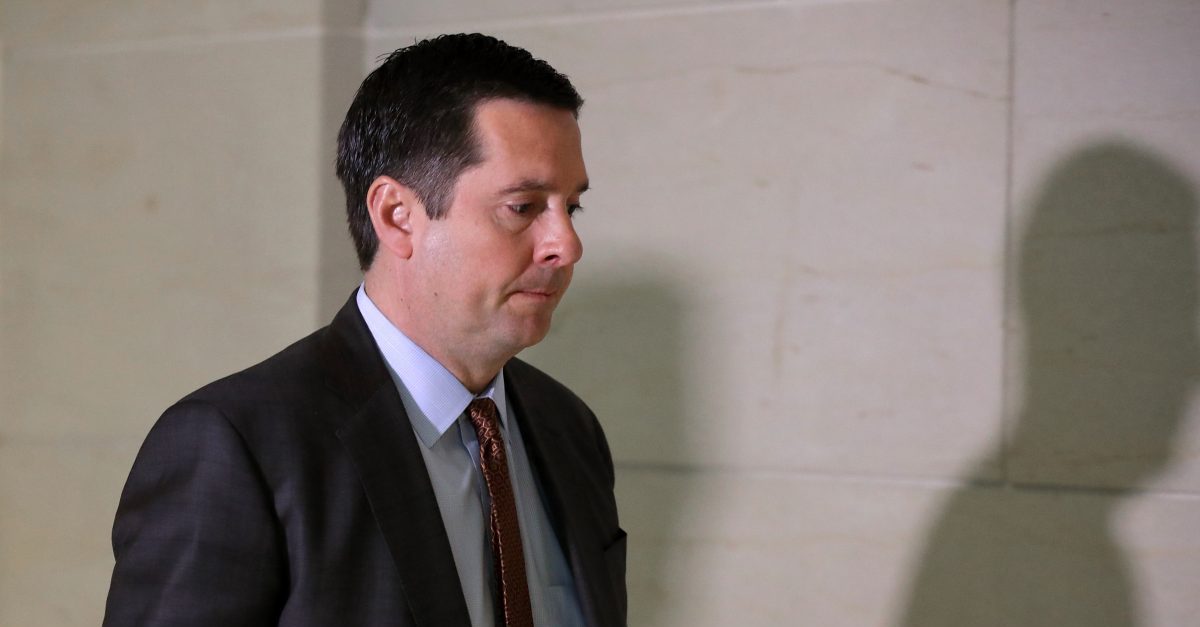
Rep. Devin Nunes (R-Calif.) has already proven his loyalty to President Donald Trump, but Tuesday’s release of transcripts from closed-door depositions in the House’s impeachment inquiry illustrated just how far the California congressman is willing to go in backing the president.
During his questioning of U.S. ambassador to the European Union Gordon Sondland, Nunes, the Ranking Member of the House Intelligence Committee, repeatedly and without evidence claimed that the Steele Dossier originated in Ukraine to justify President Trump’s interest in the country.
After yielding his opportunity to make an opening statement, Nunes entered the interview with the objective of tying the dossier to Ukraine, despite Sondland appearing to have almost no idea what he was talking about.
“I just want to go back to something [Republican Oversight Committee Aide Steven Castor] referred to about the skepticism the President has with Ukraine,” Nunes said. “I don’t know how closely you followed what this committee went through in the last 3 years, but also the Mueller investigation, special counsel. A lot of it was centered on a product called the Steele dossier. You’ve heard of that, I assume,” Nunes asked.
“Yes,” Sondland replied, opening the door for Nunes’s baseless allegation.
“Were you aware that the origins of the Steele Dossier were from Ukraine, many of the origins in the original Steele Dossier were from Ukraine, the politicians within Ukraine?” Nunes asked.
According to the transcript, Chairman of the Intel Committee Rep. Adam Schiff (R-Calif.) interrupted the questioning to say that the panel “cannot accept that as an actual or factual representation.” Nunes was undeterred.
“I don’t want to get into a tit for tat with you, but what’s factual?” Nunes asked. “The Steele dossier didn’t origin — parts of it didn’t originate in Ukraine?”
After a back-and-forth discussion among the Committee leaders about the nature of Nunes’s question, he continued on.
“So let me just restate the question for you. The Democrats disagree that the Steele dossier, I’m assuming, has anything to do with Ukraine or originations in Ukraine. However, in the Steele dossier itself it does source ‘information from Ukraine. Were you aware of that, Ambassador?” Nunes asked.
“Only recently, based on media reports,” Sondland replied.
Nunes continued to pursue this line of conspiratorial questioning. Sondland seemed to be lost.
He asked: if Sondland knew that the Clinton campaign had funded Steele’s research to get “opposition research, what have you, from Ukrainians and Russians”; if he Sondland was aware the dossier was “fed to the FBI” and “led to Special Counsel Bob Mueller.” In each instance, Sondland responded with some variation of “I don’t know anything about that.”
Nunes then got to his point: defending the president.
“So the point of this is, is that when the President says, ‘they tried to take me down,’ there were politicians that were quoted as spreading this dirt onto the Trump campaign. Could that be what the President was referring to when he said they tried to take me down?” Nunes asked.
“I don’t know what he meant,” Sondland said. “He kept repeating it, though, ‘they tried to take me down, they tried to take me down.’ He was not a fan of Ukraine, per se.”
Less than a week after Nunes’s line of questioning, which onlookers reportedly described as “nutso” and “awkward,” President Trump sat down for an interview with Fox News’s Sean Hannity. The president repeated the Ukraine-Dossier talking point.
“When you look at what’s going on and then you see all of this horrible stuff and then you hear about Ukraine — and you’ve been hearing about it,” Trump said. “I heard Clinton was involved. I heard they got somebody who wrote the fake dossier. Was it out of Ukraine?”
Gordon Sondland Testimony by Law&Crime on Scribd
[image via Chip Somodevilla/Getty Images]